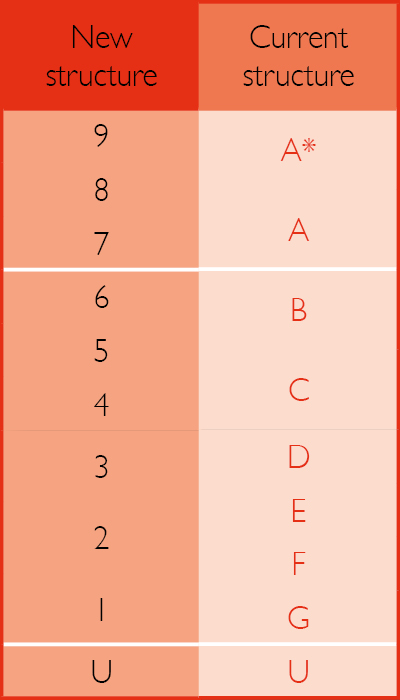Understanding The New GCSE Grading System

Last summer saw the first GCSEs papers in England graded numerically on a scale from 1 to 9. The new system has led to some teachers expressing concern, whilst many parents, grandparents and employers may know little about the changes and what it means for those students sitting exams.
Successive politicians in recent years have said that exams were too easy and needed to be made more rigorous. As a result, new GCSE exams have been developed and are being phased in over a number of years. In 2017, students sat the new style GCSEs in English literature, and language, and maths, another 20 subjects will have 9 to 1 grading this year, with most others following in 2019.
[two_third]The New System
Contrary to what you might expect, 1 is not the highest grade, in fact 9 is. It is expected that 9, now the highest achievable grade will be awarded to fewer pupils than the current top mark of A* is today.
In fact, three number grades, 9, 8 and 7, correspond to the current top grades of A* and A, this has been designed to give more differentiation at the top end – a grade 6 is higher than the old B grade.
Two Pass Marks Awarded
Under the old system, a C is seen as a good pass, however, under the new system there is a standard pass, a grade 4, and a strong pass, a grade 5. It is important to note that the Department for Education has stressed the two grading systems cannot be directly compared, but there are points where they align. For example, the bottom of the old grade C, and the bottom of the new grade 4.
Assessment Of Schools
To assess the performance of schools, they will be measured on the proportion of pupils achieving grade 4 and above, and they will also be measured on pupils achieving grade 5 and above. The grade 5 is being described as the benchmark, in line with the expectations of education systems globally.
Are New GCSEs Harder?
Politicians hope the answer is, yes. Officials atThe Department for Education say it requires exam boards to make exam content more challenging. Questions are being set out in a different format, this is especially the case in maths. The way the qualifications are taken differs with exams at the end, rather than in modules sat at different stages of the academic year is being seen as more demanding.
By Jacob White







